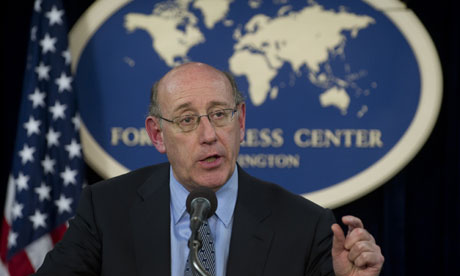 At the end of "Erin Brockovich," a housewife sick from toxic chromium weeps with joy as she's handed her portion of a historic $333 million settlement between residents of this small desert town and the utility that poisoned their drinking water.
At the end of "Erin Brockovich," a housewife sick from toxic chromium weeps with joy as she's handed her portion of a historic $333 million settlement between residents of this small desert town and the utility that poisoned their drinking water.
In real life, that woman is Roberta Walker. She still lives in Hinkley, using her share to buy a new home in what she thought would be a safe four-mile distance from the toxic plume of chromium.
Erin Brockovich Back in Hinkley Testing Water
Judge won't force Exxon to pay for more Valdez spill cleanup
 U.S. District Court Judge H. Russel Holland ruled Monday against a request that he force Exxon Mobil Corp. to pay for the cleanup of oil left on the Prince William Sound shoreline from the 1989 tanker Valdez spill.
U.S. District Court Judge H. Russel Holland ruled Monday against a request that he force Exxon Mobil Corp. to pay for the cleanup of oil left on the Prince William Sound shoreline from the 1989 tanker Valdez spill.
The request came from former University of Alaska marine science professor Rick Steiner, who filed a court motion to try and force resolution of the case. Steiner said he was frustrated because the state and federal governments filed a $92 million claim against Exxon in 2006 but never tried to collect the money.
Biology Nobelist: Natural selection will destroy us
 The cost of our success is the exhaustion of natural resources, leading to energy crises, climate change, pollution and the destruction of our habitat. If you exhaust natural resources there will be nothing left for your children. If we continue in the same direction, humankind is headed for some frightful ordeals, if not extinction.
The cost of our success is the exhaustion of natural resources, leading to energy crises, climate change, pollution and the destruction of our habitat. If you exhaust natural resources there will be nothing left for your children. If we continue in the same direction, humankind is headed for some frightful ordeals, if not extinction.
BP fund lawyer to refuse 100,000 Gulf spill disaster claims
 Upwards of 100,000 claims arising from the BP oil disaster in the Gulf of Mexico may never be paid, the beleaguered administrator of the oil company's compensation fund has acknowledged.
Upwards of 100,000 claims arising from the BP oil disaster in the Gulf of Mexico may never be paid, the beleaguered administrator of the oil company's compensation fund has acknowledged.
A defensive Ken Feinberg, under fire from the Obama administration, Gulf leaders and local business for the slow pace of payouts for losses due to the BP spill, said the vast majority of the 130,000 unsettled claims did not have adequate documentation.
Regulation Lax as Gas Wells’ Tainted Water Hits Rivers
 The American landscape is dotted with hundreds of thousands of new wells and thousands of drilling rigs, as the country scrambles to tap into this century’s gold rush — for natural gas.
The American landscape is dotted with hundreds of thousands of new wells and thousands of drilling rigs, as the country scrambles to tap into this century’s gold rush — for natural gas.
The gas has always been there, of course, trapped deep underground in countless tiny bubbles, like frozen spills of seltzer water between thin layers of shale rock. But drilling companies have only in recent years developed techniques to unlock the enormous reserves, thought to be enough to supply the country with gas for heating buildings, generating electricity and powering vehicles for up to a hundred years.
GMOs Causing Cattle Miscarriages, Researcher Alleges
 "Unknown Organism" Found in Roundup Ready Crops
"Unknown Organism" Found in Roundup Ready Crops
A Purdue University researcher has linked Monsanto's Roundup Ready crops to an organism leading to miscarriages and spontaneous abortions in farm animals.
Professor Emeritus Don M. Huber has sent a letter to Agriculture Secretary Tom Vilsack, warning that an “electron microscopic pathogen” found in high concentrations of GM crops could significantly impact the health of both animals and humans.
Agent Orange 'used to clear Canadian roads until 1980s'
 Canadian officials have acknowledged the country used Agent Orange to clear roadside brush as late as the 1980s. Provincial Transportation Minister Kathleen Wynne promised an inquiry after the Toronto Star revealed use of the Vietnam War-era defoliant.
Canadian officials have acknowledged the country used Agent Orange to clear roadside brush as late as the 1980s. Provincial Transportation Minister Kathleen Wynne promised an inquiry after the Toronto Star revealed use of the Vietnam War-era defoliant.
The chemical was used by the US military to strip Vietnam's jungles. Vietnam says Agent Orange is responsible for massively high instances of genetic defects in areas that were sprayed.
More Articles...
Page 144 of 201

 Environmental Glance
Environmental Glance






























